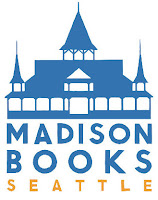 Seattle-area novelist Robert Ferrigno’s Prayers for the Assassin had won the 2007 Gumshoe Award for Best Thriller of the Year.
Seattle-area novelist Robert Ferrigno’s Prayers for the Assassin had won the 2007 Gumshoe Award for Best Thriller of the Year.I love it when a writer takes a risk, moves out of the middle ground, and steers (or more often drags) the genre into new avenues. As in any uncertain enterprise, this usually brings on more failures than successes. But in my opinion, Ferrigno took a tremendous risk when he broke away from writing a succession of dark, edgy--and critically popular--tales of crime (such as The Wake-Up and Scavenger Hunt) to instead deliver the futuristic and politically charged Prayers, which imagines a post-9/11 United States being divided primarily along religious lines, with most of the country turned into the Islamic States of America. And that risk has paid off. Yes, many readers were confused by Ferrigno’s switch of literary directions, while others flinched. I cheered, though, and want to pat the Gumshoe judges on their backs for demonstrating taste, perception, and insight.
I had a chance to spend some time with Ferrigno at ThrillerFest last summer in Phoenix, Arizona, and found him to be one of the most modest writers I’ve ever met. (That opinion has been expressed previously in interviews conducted by Tangled Web editor Bob Cornwall and The Rap Sheet’s own J. Kingston Pierce.) So enjoyable was his company, that I set about to read his entire backlog of books--and succeeded. Following on last week’s Gumshoe win, and with the paperback version of Prayers for the Assassin due out at British booksellers this week, I decided to ask Ferrigno a few questions about where Prayers came from, reader response to the novel, and his work on sequels.
Ali Karim: First off, Robert, congratulations on winning the Gumshoe for Best Thriller. How does it feel?
Robert Ferrigno: It’s very enjoyable, particularly in light of the high caliber of the other authors nominated. I wish instead of [Mystery Ink] actually naming a “winner,” the nominees could just get together for dinner and drinks.
AK: So, tell us a little how you came upon this unusual story you told in the groundbreaking Prayers for the Assassin.
RF: I started it shortly after 9/11, when everyone was torqued and angry and certain that victory was easy. I started wondering, as authors with rather bleak points of view are wont to do, what would happen if the West lost? This was actually a radical position to take, the U.S. having the greatest and most sophisticated war capability on the planet. So I tried to imagine how it could happen, and that led me to the belief that while we couldn’t be defeated militarily, we could lose on a very different battlefield. We could lose because of an internal weakness, a failure of vision, a failure to see beyond the next television show, the next launch of some crap product designed to make our lives shiny and bright and fun-fun-fun. In a generation-long struggle, don’t count on technology to win the war; it’s going to take tenacity and strong belief. Most of us in the West have very short-term event horizons. Muslims fight to the death over theological differences that happened over 1,000 years ago. Americans can’t remember who won the Academy Award for Best Picture last year.
So that was the impetus: the potential for losing the war and the effect losing would have. I also wanted to write about a protagonist who has lost his faith and feels that loss acutely. A tough guy that has to continue on, making it up as he goes along, choosing right from wrong without any guidance other than his own morality. I had always wanted to write about this kind of character, and it’s kind of ironic that when I finally did it, the faith he had lost was Islam. My protagonist is Rakkim Epps, an elite Fedayeen warrior who aches when he hears the call to prayer, knowing he is no longer part of the faithful.
AK: Were you, your agent, or your publishers at all concerned about this subject matter?
RF: I knew it was going to be a huge risk in every sense of the word. My previous eight novels had all been noir thrillers set in Southern California, and here I was writing a political thriller set 30 years in the future, writing about a subject many people felt uncomfortable about. When I first told my agent what I was up to, she said, “You can’t be serious.” When I assured her I was, she said the move was “career suicide.” We had been together for 15 years and six books, and I consider her a trusted advisor as well as my agent. But I told her if she didn’t think she could represent the book with all her heart, we should part friends. She stayed on. My publisher at the time [Pantheon], for whom I had written four books, passed very quickly on the proposal. Very quickly. We had better luck with the next publisher [Scribner] we spoke with, and they fully supported the book.
AK: What’s been the reaction from your traditional readers?
RF: I think my traditional readers have always expected the unexpected from me. I don’t do series, so readers are used to being taken on a new ride every time. My heroes are non-traditional and I don’t do neat and tidy endings. Many readers e-mailed me to say that they bought the book with some trepidation about my “change,” but that they enjoyed the book immensely, and still felt it was a “Ferrigno novel.” I feel very grateful to have readers that are open and enthusiastic and willing to give me the freedom to try new things. Of course, if I produced a lousy book, they would beat me with their copy. Hardbacks too.
AK: Have you attracted readers outside of the thriller and mystery community?
RF: Prayers for the Assassin was my best-selling book ever in the U.S., making The New York Times and L.A. Times best-seller lists. I got a lot of new readers in the literary, political, and sci-fi communities. I also found on book tour that I had many new faces, plenty of U.S. military personnel and a lot of American Muslims, who were very interested and stayed afterwards to talk. They all bought books.
AK: Prayers is coming out in paperback in the UK. How has this work been received internationally?
RF: The international reception was very interesting. My UK publisher was solid. France, Germany, and Italy--where all my prior books had been picked up--rejected the manuscript, citing fears of lawsuits and potential violence. Oddly enough, my first international sale was to the largest publisher in Turkey, a modern Islamic republic, much like the one envisioned in Prayers. I had never sold a book in Turkey before. Russia, mainland China, Taiwan, Romania, and Thailand also bought the book--all countries where I had never had a prior sale, all countries with sizable Muslim populations. An Arabic edition will be published shortly. I think publishes in those countries actually read the book and realized that Muslims weren’t being painted as evil. There are moral and good Muslims in Prayers, and evil Muslims; moral and good Christians and evil Christians. As one of the characters says, “It’s not the faith, it’s the faithful that’s the problem.”
AK: I understand you’re planning a sequel.
RF: I wrote Prayers as a standalone, but always hoped it could be the first book of a trilogy. Publishing, being a tough business, does not allow sequels of books that don’t sell. The success of Prayers allowed my U.S. publisher to offer me a contract for the final two books of the trilogy. I just turned in the manuscript for [the first sequel,] Sins of the Assassin, and my publisher is very happy with it. [The novel has a February 2008 publication date.] I’ll be starting the final book in a few weeks.
AK: I want to say again that I enjoyed meeting you at ThrillerFest in Phoenix. But that was a long time ago now. What else is new in your world, Robert?
RF: Great meeting you too, Ali, and I’m glad the 110-degree [Fahrenheit] heat in Phoenix didn’t daunt the good times. Well, what’s new in my world? I’m happily boring. I love to write and spend most of my time working, playing with my family, romping with the dogs, and going to movies.
AK: And finally, what’s been on your reading table recently?
RF: Loved The Winter of Frankie Machine, by Don Winslow. Ditto The Reincarnationist, by M.J. Rose, which should be out soon [in September]. And I just finished reading a short story collection called Los Angeles Noir [edited by Denise Hamilton].
(Ferrigno fans take note: The author has a short story, “The Hour When the Ship Comes In,” in Los Angeles Noir. So if you can’t wait for Sins of the Assassin, let this tide you over for a bit.)

















No comments:
Post a Comment